What is “World Ocean Day”?
World Ocean Day, observed annually on June 8th, serves as a global reminder of the crucial role oceans play in sustaining life on Earth. In 2024, a new multi-year action theme begins, and it is…“catalyzing action for our ocean and climate.” This theme is significance and timely amid escalating concerns over coral reefs bleaching, increasing toxic algal blooms, and plastic pollution. The theme emphasizes the urgent need for collective action to preserve critical marine biodiversity and ecosystems.
World Oceans Day 2024 (WOD-2024) underscores the interconnectedness of human actions and the health of marine environments. With over 70% of the Earth’s surface covered by oceans, they regulate climate, produce oxygen, and support diverse marine life. This year’s theme revolves around fostering greater awareness of the need for balance between human actions and the complexity of oceans and climate. In addition, pollution, overfishing, and habitat loss also impact the health and ecosystem function of our oceans necessitating a concerted, multi-national effort to address or mitigate their impacts.
The objectives of World Ocean Day, in general, are multifaceted. At its core, the day aims to raise awareness about the importance of oceans and promote conservation efforts. Through education and advocacy, World Oceans Day strives to inspire action at local, national, and global levels, emphasizing the need for sustainable practices and policies to protect marine ecosystems for future generations. Specific goals of WOD-2024 include;
- making the best use of existing climate solutions;
- accelerating a just transition to clean and renewable energy;
- rapidly and equitably phasing out production of single use plastics;
- amplifying the voices of local leaders working to implement action in their communities;
- protecting and restore natural coastal and ocean ecosystems (and on land) by creating effectively protected areas covering at least 30% of our lands and waters by 2030; and
- creating more solutions at the local, national and international levels that are based on the best science (learn more at, World Ocean Day 2024).
However, despite the growing recognition of the challenges facing our oceans, significant obstacles remain. Increasing surface ocean temperatures exacerbate issues such as ocean acidification and coral bleaching, threatening the very foundation of marine life. Plastic pollution continues to choke our seas, with devastating impacts on marine animals and habitats. Overfishing (illegal, unreported and/or unregulated) depletes fish stocks, jeopardizing food security for millions of people who depend on the oceans for sustenance, economic livelihoods, and survival. Addressing these challenges requires a holistic approach, combining scientific research, policy reforms, and individual behavioral changes.
In conjunction with World Oceans Day, Coral Triangle Day on June 9th represents a poignant example of efforts to raise awareness about the value of marine biodiversity. The Coral Triangle, spanning the waters of six countries in Southeast Asia and the Pacific, is renowned for its unparalleled marine richness and serves as a critical habitat for numerous species, including vibrant coral reefs. By dedicating a day specifically to celebrate and protect the Coral Triangle, stakeholders aim to highlight the ecological significance of this region and the urgent need for conservation efforts. Coral Triangle Day serves as a catalyst for education, community engagement, and collaborative action, demonstrating how localized initiatives can contribute to broader efforts to safeguard our oceans. This observance underscores the interconnectedness of marine ecosystems and reinforces the message that preserving biodiversity in one region reverberates globally, emphasizing the importance of collective responsibility in ocean conservation efforts.
Individuals can play a crucial role in helping to protect our oceans. By adopting sustainable lifestyles, reducing consumption, conserving water, and supporting initiatives that value natural shorelines and increased marine protected areas, individuals can contribute to collective efforts that build towards a more sustainable future for all. For example, here at Aggressor Adventures®, we’ve developed and implemented an award-winning, in-house sustainability program, Green the Fleet that works to increase sustainability in day-to-day operations both on land and at sea. Also consider supporting our official non-profit conservation partner, the Sea of Change Foundation that helps fund community-based conservation around the world; and wherein 100% of funds donated go directly to such projects. Or learn how you can become a more sustainable traveler with our official, free, and downloadable guide, here.
In conclusion, World Oceans Day 2024 serves as a poignant reminder of our responsibility to protect and preserve the oceans for current and future generations. By raising awareness, promoting conservation efforts, and fostering collaboration, we can work towards ensuring a sustainable future for important marine ecosystems. As we commemorate this day, let us reaffirm our commitment to safeguarding the blue heart of our planet, recognizing that the health of our oceans is inseparable from human health and that of our amazing, vibrant, one-of-a-kind planet.
Join us for the 2024 #WorldOceanDay celebrations by starting or joining an event here, and/or following #WorldEnvironmentDay2024 or #CoralTriangle.




